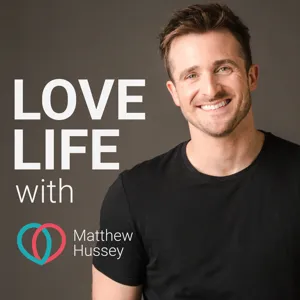Podcast Summary
Navigating Modern Dating: Understanding Its History and Pressures: Modern dating brings new challenges due to its recent existence and increased options, but remembering historical context and unique pressures can help us make informed decisions.
Modern dating can be particularly challenging due to its relatively new existence and the increased pressure on individuals to define their own identities and make the important decision of choosing a partner without external help. Dating, which began around 1890, has seen the rise of online dating since 1995 and dating apps for about a decade. With this newfound freedom comes pressure to write our own stories and make the right decision, as it's often described as the most important decision we'll ever make. Additionally, with the increase in options through dating apps, the decision-making process can feel overwhelming. It's important to remember that this new terrain is normal and that we're all figuring it out together. Understanding the historical context and the unique pressures of modern dating can help us navigate it more successfully.
Marriage through the ages: From practical arrangement to self-actualization: Marriage has evolved from a practical arrangement to a source of self-actualization, bringing benefits like deeper connection and personal growth, but also challenges like higher expectations and more divorces.
The concept of marrying for love is relatively new in human history. For most of history, marriage was more about economic and cultural considerations than romantic feelings. It was a means of bringing different groups together and securing alliances. The idea of marrying for love, as we understand it today, emerged during the romantic era around 17/50. Nowadays, as we've met our basic needs, questions of meaning, purpose, self-actualization, and intimacy have become more prominent. Marriage has evolved to meet these needs, but this has also led to higher expectations and more divorces for reasons that would have been unheard of in the past. In essence, the evolution of marriage from a practical arrangement to a source of self-actualization has brought about both benefits and challenges.
Biases in Relationships: The Romanticizer, The Maximizer, and The Hesitator: Recognizing and overcoming romanticizer, maximizer, and hesitator biases can help us find and maintain healthy, satisfying relationships. Be open-minded, understand perfect partners don't exist, and recognize readiness for dating is subjective.
Our biases significantly impact our approach to relationships, leading to unrealistic expectations and potential dissatisfaction. These biases can be categorized into three tendencies: the romanticizer, the maximizer, and the hesitator. The romanticizer believes in the concept of a soulmate and may dismiss relationships that require effort. The maximizer seeks the perfect partner through endless research and believes in the existence of an ideal match. The hesitator, on the other hand, has unrealistic expectations of themselves and believes they are not ready to date until they meet certain conditions. These tendencies can hinder our ability to find fulfilling relationships. To combat these biases, it's essential to adopt antidotes such as being more open-minded, recognizing that perfect partners don't exist, and understanding that readiness for dating is a subjective concept. By acknowledging our biases and working to overcome them, we can improve our chances of finding and maintaining healthy, satisfying relationships.
Focusing on values and compatibility is key to a successful relationship: Research shows that similar personalities, mutual respect, and effective communication are more crucial for long-term compatibility than superficial factors like looks or shared interests.
While it's natural to desire certain qualities in a partner, such as looks or shared interests, these factors may not be as important in the long run as we believe. Instead, focusing on values and the ability to work through challenges together can lead to a more successful and fulfilling relationship. People often overestimate the importance of superficial factors, but research shows that similar personalities, mutual respect, and effective communication are more crucial for long-term compatibility. It's essential to be open-minded and willing to compromise on less significant aspects to build a strong foundation for a lasting connection.
Evaluating Relationships During Times of Change: During uncertain times, focus on shared values and personal growth for stronger relationships, rather than just shared activities.
During times of change and uncertainty, such as a pandemic, it becomes essential to evaluate relationships based on shared values rather than just shared activities. The pandemic forced many people to spend extended periods with their partners, leading to revelations about the true nature of their relationships. While some found their relationships improved, others discovered they were not compatible. It's important to remember that having different hobbies or interests does not necessarily mean a relationship is doomed, as long as both partners respect each other's passions. Maximizers, who are always searching for the perfect partner, can benefit from recognizing that there might not be a "Frankenstein perfect partner" out there and that focusing on personal growth and self-improvement can lead to more fulfilling relationships.
Focus on investing in your current relationship instead of constantly searching for the perfect one: By the age of 26, aim to have dated around 33% of your potential dating pool. This person becomes your benchmark, and when you meet someone as good or better, commit to them. Help those struggling to find potential partners by acknowledging their feelings, empathizing, and broadening their horizons.
You may have already encountered a great partner in your dating history, and the focus should be on investing in and building a strong relationship with them instead of constantly searching for the "perfect" person. This concept is known as the secretary problem, where you interview a certain percentage of potential candidates before making a decision. In the context of dating, you should aim to have dated around 33% of your potential dating pool by the age of 26.1. This person becomes your benchmark, and when you meet someone as good or better, you should commit to them. It's essential to understand that everyone's dating experiences are unique, and it's common for some individuals, particularly women, to feel like they haven't met anyone appealing. In such cases, it's crucial to acknowledge their feelings, empathize, and help them reassess their standards or broaden their horizons to find potential partners who may not fit the "perfect" mold but can still bring joy and fulfillment to their lives.
Exploring patterns in your dating history and attachment style: Identify trends in your dating experiences, understand your attachment style, and utilize resources like podcasts and self-care products to improve your dating journey
Everyone's dating experience is unique, but there are universal trends. If you're struggling to make connections, it can be helpful to identify patterns in your dating history and explore your attachment style. The dating world can feel challenging, but there are resources available to make the process easier. For example, the ZOE Science and Nutrition podcast offers science-based information to help you make informed decisions about your health, including your mental health. Additionally, the simplicity of OneSkin's skincare products can help you prioritize self-care in your daily routine. Remember, finding happiness and connection takes time and effort, but it's worth it. And if you're feeling stuck, don't hesitate to seek support from trusted resources or friends.
Taking responsibility for our own role in dating: Recognize personal shortcomings, focus on growth, and avoid idealizing others as perfect containers
It's important to recognize and address our own role in our dating experiences instead of solely blaming external factors. The tendency to externalize our problems and focus on finding the "perfect" partner can lead us to overlook our own shortcomings and miss opportunities for growth. As the speaker shared, sometimes the issue lies within ourselves, such as becoming a better dater or working on personal development. The idea that "one of the most difficult things to face is everything you ever wanted" highlights the danger of objectifying others and turning them into idealized containers rather than seeing them as complex individuals. By taking a more introspective and pragmatic approach, we can increase our chances of finding a fulfilling relationship.
Fear of Connection Prevents Us from Finding Love: Fear can prevent us from connecting with others, leading us to create stories and set deal-breakers to protect ourselves. Recognizing that growth and improvement come from taking action is essential.
Fear can prevent us from finding and maintaining fulfilling relationships. We create stories to protect ourselves from potential pain or discomfort, and these stories can manifest as reasons for not connecting with others. Some people avoid connection altogether due to fear of settling or fear of the unknown. Others may have specific deal-breakers that they use to avoid potential partners. The hesitators, on the other hand, may wait endlessly for the "perfect" moment to start dating, believing that they need to be perfect first. However, this mindset prevents individuals from practicing and improving their skills in building relationships. Ultimately, it's important to recognize that there's no such thing as being completely ready and that growth and improvement come from taking action and putting ourselves out there.
Discussing mental health openly can increase the likelihood of a second date: Valuing personal growth and mental health is important in modern dating, but don't forget the emotional connection and 'spark' in relationships
Prioritizing personal growth and mental health are important aspects of modern dating. Therapy and self-improvement are no longer stigmatized, but rather valued by a majority of daters. In fact, discussing mental health openly can even increase the likelihood of a second date. However, it's essential to strike a balance between being informed by data and science and maintaining the romantic aspects of relationships. The analytical approach can be helpful, but it's crucial not to overlook the importance of emotional connection and the "spark" that draws us to someone. Ultimately, the goal is to find a partner who values both personal growth and emotional intimacy.
The importance of small moments in a relationship: Focusing on small moments of connection, called 'bids,' can build a strong foundation for a long-lasting and fulfilling relationship.
The key to a successful and romantic relationship goes beyond the initial meeting or the passionate moments. It's about finding someone who makes the mundane moments enjoyable and turning towards each other in small moments of connection called "bids." These micro-moments, such as a simple conversation or a touch, have a significant impact on the relationship. The work of relationship experts like the Gottmans shows that turning towards these bids is more important than grand romantic gestures. By focusing on these small moments, we can build a strong foundation for a long-lasting and fulfilling relationship.
Daily investments in relationships matter: Successful relationships require consistent effort through daily investments, recognizing shifting priorities, and effective communication during conflicts.
Successful relationships require consistent effort and small acts of connection, rather than grand gestures. These "micro moments" of warmth and affection are predictive of healthy partnerships and can be seen in couples who prioritize daily investments in their relationship. Additionally, it's important to recognize that what matters in a long-term partner shifts as the relationship progresses. While looks, money, and shared hobbies may be important in the early stages, qualities like kindness, loyalty, emotional stability, and the ability to make hard decisions and fight well become more crucial over time. And, it's not about avoiding conflict, but rather learning how to fight well, giving feedback without contempt, and repairing the relationship after disagreements. Ultimately, successful relationships require a willingness to navigate differences and prioritize daily investments in the partnership.
Building meaningful relationships through differences and banter: Focus on the emergence of each other's true selves, use dating apps effectively, and gauge potential chemistry through banter and common interests.
Meaningful relationships can be built on differences and playful banter, rather than trying to change each other. The speaker shares an example of her own relationship and how they poke fun at each other's traits within a loving framework. She emphasizes that it's essential to focus on the emergence of each other's true selves when they're together, rather than just their individual paper qualities. The speaker also discusses the importance of using dating apps effectively, as they have become a popular way for people to meet, and encourages individuals to use them as part of their dating diet. The speaker references research that shows that meeting online is the most common way for couples to meet these days, and it doesn't prevent meeting people in real life. Instead, it's an opportunity to meet a large number of people and find potential matches. The key is to look at people's profiles, understand what can and cannot be determined, and focus on banter and common interests to gauge potential chemistry.
Approach dating with an open mind: Focus on genuine interaction and connection in the moment, rather than relying on preconceived notions or a checklist.
When it comes to dating, it's important to approach it with an open mind and be willing to get to know people in person rather than relying solely on dating apps. Chemistry is best discovered through genuine interaction, and assumptions based on a checklist or preconceived notions can limit potential connections. Instead, focus on the present moment and how you feel around the person. Additionally, the idea of finding love based on modern notions is a relatively new concept, and it's important to remember that people can surprise us and that the perfect match may not fit into a predefined rubric. So, throw out the checklist, be open to new experiences, and focus on the connection in the moment.
The importance of emotional stability and effective conflict resolution in relationships: Emphasize emotional stability, kindness, and conflict resolution skills over physical attraction and shared interests for a successful and fulfilling partnership.
While physical attraction and shared interests are important in a relationship, they should not be overemphasized at the expense of emotional stability, kindness, and the ability to handle conflict effectively. These latter qualities are often underestimated but crucial for a successful and fulfilling partnership. Conflict is inevitable, and the key is to navigate it well. It's essential to find a partner with whom you can communicate openly and improve the relationship through healthy disagreements. Settling for less than ideal qualities in a partner should be avoided, but it's also important to remember that every relationship brings its unique mystery and wonder. The tools and insights shared in the conversation are meant to help individuals find and maintain relationships that accentuate these aspects rather than detract from them. If you're interested in learning more from Logan, check out her newsletter, social media channels, book, and Love Smarter coaching program, all linked in the podcast description. Don't forget to subscribe, rate, and review the show, and consider supporting us on Patreon.






